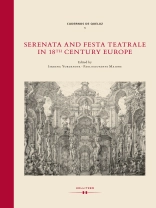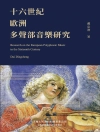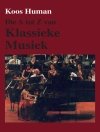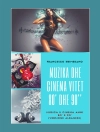This volume is dedicated to ‘Serenata and Festa Teatrale in 18th Century Europe’, especially to the production of this music-dramatic genre at the courts on the Iberian Peninsula, in Italy, and the Holy Roman Empire where it was an integral part of court ceremonials and a privileged ritual of repraesentatio maiestatis. The 16 studies on patrons and artists, exceptional events and local traditions,
reveal highly interesting material for the research on these up to now largely neglected genre. Any approach to these works full of metaphors, symbols and allusions has to take into account the context of the celebration and the resulting multiplicity of aspects: choice of themes, dramaturgical forms, textual and musical structures, vocal and instrumental ensembles, and the various options regarding the stage apparatus.
‘Serenata and Festa Teatrale in 18th Century Europe’, edited by Iskrena Yordanova (Lisbon) and Paologiovanni Maione (Naples), inaugurates the series ‘Cadernos de Queluz’, a subseries of ‘Specula Spectacula’ by Don Juan Archiv Wien.
Jadual kandungan
Prefaces
* Cadernos de Queluz (Massimo Mazzeo – Hans Ernst Weidinger)
* Introduction (Iskrena Yordanova – Paologiovanni Maione)
PART I: THE HOUSES OF PORTUGAL AND AUSTRIA
Barcelona (1709)
* ‘ Numeroso Culto, músico festejo, en aplauso de las felicissimas,
y reales bodas ‘ A Spanish Serenata at Archduke Charles’ Court in Barcelona Celebrating the Marriage of his Sister Marianna of Austria with King João V of Portugal on 5th February 1709. A Brief Analysis of Court Ceremonial in Barcelona During the War of Spanish Succession Based on Contemporary Descriptions of this Celebration (Danièle Lipp)
Lisbon (1708-1754)
* O espaço teatral na corte de D. João V e o papel da rainha Maria Ana de Áustria na promoção da ópera em Portugal (Giuseppina Raggi)
Vienna (1705-1740)
* Festa teatrale e serenata alla corte imperiale di Vienna nella prima metà del Settecento (Andrea Sommer-Mathis)
PART II: ITALIAN COURTS AND CITIES
Tuscany (1658-1737)
* Francesco Balvovini e le serenate ‘rustico civili’ per Calendimaggio (Giulia Giovani)
Rome (1681-1740)
* Serenate e cantate nel sistema culturale romano del primo Settecento (Silvia Tatti)
* Serenate alla corte romana del cardinale Pietro Ottoboni (1667–1740) nell’epoca di Arcangelo Corelli: storia e proteizzazione di un genere (Teresa Chirico)
Naples (1709-1736)
* A Survey of Alessandro Scarlatti’s Late Serenatas (1709–1723) (Thomas Griffin)
* Nuove fonti per l”Andromeda liberata’: Albinoni, Caldara, Porpora (Giovanni Andrea Sechi)
Venice (1716-1782)
* A cavallo tra i generi: le serenate di Vivaldi e gli autoimprestiti dalle opere (Giada Viviani)
* ‘ Onori et accoglimento ‘: qualche nota su musica per la politica
e politica musicale a Venezia nella seconda metà del Settecento (Giovanni Polin)
Savoy (1713-1789)
* I festeggiamenti per le incoronazioni a Palermo di Vittorio Amedeo II (1713) e Carlo III (1735): musica, spettacolo e cerimonia (Ilaria Grippaudo)
* ‘Non nisi grandia canto’: feste teatrali e spettacoli d’occasione alla corte sabauda nel secondo Settecento (Annarita Colturato)
PART III: THE HOUSES OF FRANCE AND AUSTRIA
The Bourbons in Naples and Parma (1745-1782)
* La marina risplendente ‘per le nozze del real delfino colla reale infante di Spagna’ (Napoli 1745) (Paologiovanni Maione)
* ‘ Inebriati d’un nuovo genere di piaceri ‘. Alessandro e Timoteo a Parma: metamorfosi della festa teatrale (Paolo Russo)
Metastasio Poeta Cesareo (1760-1799)
* Un” ingegnosa congiunzione ‘. La serenata ‘Tetide’ di Gluck per una pace asburgica europea (1760) (Armando Fabio Ivaldi)
* ‘L’Isola disabitata’ di Metastasio ripresa per Maria Carolina (Bologna 1768). Storia di un ripopolamento, fra canto e danza (Andrea Chegai)
APPENDIX
* Index of persons
* List of illustrations
Mengenai Pengarang
Iskrena Yordanova is violinist and musicologist. Her main research interest focuses on Portuguese and Italian 18th-century repertoire. Since 2014 she is coordinating the research activities and international conferences at ‘Divino Sospiro – Centro de Estudos Musicais Setecentistas de Portugal’. She edited serenatas and oratorios by D. Perez, N. Jommelli, J. Cordeiro da Silva, J. de Sousa
Carvalho and P. A. Avondano, performed widely with great success.
Paologiovanni Maione is professor for the history of music at the Conservatorio San Pietro a Majella and scholar at the Istituto italiano per gli Studi filosofici, both in Naples, as well as member of
the scientific committees of various international institutions, e.g. of ‘Divino Sospiro – Centro de Estudos Musicais Setecentistas de Portugal’. He has published several books especially on the musical life in Naples in the 18th Century.












